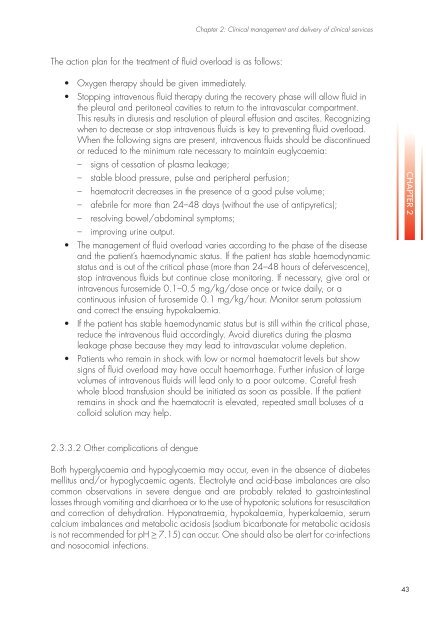dengue-diagnosis
dengue-diagnosis
dengue-diagnosis
You also want an ePaper? Increase the reach of your titles
YUMPU automatically turns print PDFs into web optimized ePapers that Google loves.
Chapter 2: Clinical management and delivery of clinical services<br />
The action plan for the treatment of fluid overload is as follows:<br />
• Oxygen therapy should be given immediately.<br />
• Stopping intravenous fluid therapy during the recovery phase will allow fluid in<br />
the pleural and peritoneal cavities to return to the intravascular compartment.<br />
This results in diuresis and resolution of pleural effusion and ascites. Recognizing<br />
when to decrease or stop intravenous fluids is key to preventing fluid overload.<br />
When the following signs are present, intravenous fluids should be discontinued<br />
or reduced to the minimum rate necessary to maintain euglycaemia:<br />
– signs of cessation of plasma leakage;<br />
– stable blood pressure, pulse and peripheral perfusion;<br />
– haematocrit decreases in the presence of a good pulse volume;<br />
– afebrile for more than 24–48 days (without the use of antipyretics);<br />
– resolving bowel/abdominal symptoms;<br />
– improving urine output.<br />
• The management of fluid overload varies according to the phase of the disease<br />
and the patient’s haemodynamic status. If the patient has stable haemodynamic<br />
status and is out of the critical phase (more than 24–48 hours of defervescence),<br />
stop intravenous fluids but continue close monitoring. If necessary, give oral or<br />
intravenous furosemide 0.1–0.5 mg/kg/dose once or twice daily, or a<br />
continuous infusion of furosemide 0.1 mg/kg/hour. Monitor serum potassium<br />
and correct the ensuing hypokalaemia.<br />
• If the patient has stable haemodynamic status but is still within the critical phase,<br />
reduce the intravenous fluid accordingly. Avoid diuretics during the plasma<br />
leakage phase because they may lead to intravascular volume depletion.<br />
• Patients who remain in shock with low or normal haematocrit levels but show<br />
signs of fluid overload may have occult haemorrhage. Further infusion of large<br />
volumes of intravenous fluids will lead only to a poor outcome. Careful fresh<br />
whole blood transfusion should be initiated as soon as possible. If the patient<br />
remains in shock and the haematocrit is elevated, repeated small boluses of a<br />
colloid solution may help.<br />
CHAPTER 2<br />
2.3.3.2 Other complications of <strong>dengue</strong><br />
Both hyperglycaemia and hypoglycaemia may occur, even in the absence of diabetes<br />
mellitus and/or hypoglycaemic agents. Electrolyte and acid-base imbalances are also<br />
common observations in severe <strong>dengue</strong> and are probably related to gastrointestinal<br />
losses through vomiting and diarrhoea or to the use of hypotonic solutions for resuscitation<br />
and correction of dehydration. Hyponatraemia, hypokalaemia, hyperkalaemia, serum<br />
calcium imbalances and metabolic acidosis (sodium bicarbonate for metabolic acidosis<br />
is not recommended for pH ≥ 7.15) can occur. One should also be alert for co-infections<br />
and nosocomial infections.<br />
43


